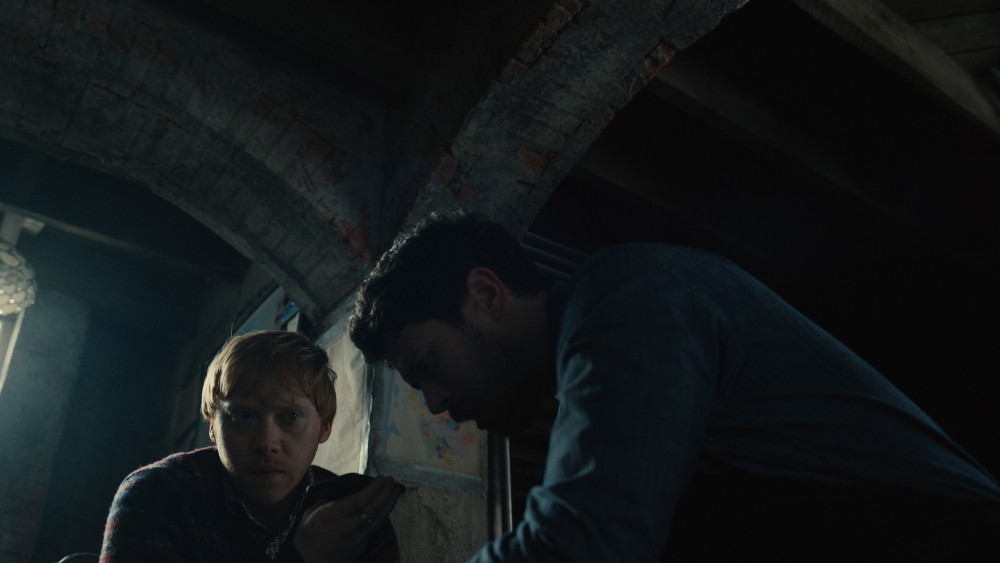
The first time you hear the music of Trevor Gureckis, you’re likely to pay attention, because it’s so unique and distinctive from other more traditional film scores. Whether you’ve heard his work on M. Night Shyamalan’s Apple TV+ series, Servant, which recently wrapped its second season, or in movies like Neil Burger’s Voyagers or John Crowley’s The Goldfinch, the music always stands out from the music you might typically hear scoring to picture.
Gureckis’ work for Servant is particularly compelling, since it’s such a tense show to begin with, where you’re not always sure where it’s going or even what’s happening, so having these jarring and sometimes discordant themes, sometimes scratched out on a single violin, it brings a lot to the tension Shyamalan is trying to create in the viewer.
Below the Line got on Zoom with Gureckis a few weeks back, the composer obviously a little exhausted from the fact he was the new father of a four-month-old. Over the course of 40 minutes, we learned more about his background and talked a lot about working with Shyamalan, including on the filmmaker’s upcoming thriller, Old.

Below the Line: I usually like to start by learning something about the background of those I’m interviewing, especially when it comes to composing. I tend to hear similar stories, whether they’re band people beforehand or studied at Julliard. So which direction did you take into film and television score?
Trevor Gureckis: Totally the orchestral or classical background. I actually studied classical piano as my undergrad degree, very much in the plan of being a classical pianist, and then I was at the University of Texas in Austin. At the end of those four years, I started taking some composition lessons, I got really into new music, or modern music and felt like I connected with certain composers like [Henryk] Gorecki and [György] Ligeti, just really interesting — well, living at the time — so I wanted to start writing music myself, and so I went to Yale for a master’s degree in composition. So then I was like, “Alright, I’m going to be a classical composer now.” Of course, I’ve always liked film music and film scores. I always thought that was a good venue for classical music. When I say classical music, I guess it’s shorthand for saying instrumental music in the non-popular genre.
I’ve been doing a lot of modern classical music, referred to as New Music. Sometimes people are like, “Well, what’s ‘New Music’?” New music is music that’s written by colleagues of mine from Yale and Juilliard, and it’s all played at BAM and played at all the great venues here in New York, uptown and downtown, Columbia, and all that stuff. So I did two years at Yale and I interned for Philip Glass in between there. I was a huge fan of his anyway, so landing that internship was really awesome, and then I worked for him for like six years. I was working with him as his sole assistant helping with anything from just picking up music from his house, to transcribing it and making MIDI mockups, doing light arrangements, but really he wrote everything by hand, so it was full orchestration by hand. I would just kind of like put it in the computer, play it back so that he could make some adjustments, and then we would work with the director in that way. Since he didn’t do anything on computer himself. I would be that kind of conduit for him. And I met people in advertising or film and music editor while doing that, because obviously, he’s a top-level composer.
I was the assistant though, so of course, whenever you’re assisting, you’re always like the assistant. But it took years and years for that assistant position to appear more like, “Oh, you’re actually a composer?” That takes a long [time] — totally understandably, because you’re very much at the service of doing what Philip needed and doing what they needed from Philip and tweaking this or “Can you make that a violin?” It’s Philip’s music, not my music.
I just got more into advertising first. I started a music production company called Found Objects with another composer named Jay Wadley. We actually met at Yale, and we started this company together, and while we were doing this, he was working with Rufus Wainwright, and I was working with Philip in this apprenticeship world, as we were slowly building this advertising music-based foundation, I guess, doing, really interesting and more aspirational things. And then things seemed to just follow where it goes. We did some stuff on Kanye‘s Life of Pablo record, and I worked with another composer, Caroline Shaw, and we did a remix of some of Kanye’s stuff, and did a whole show with him at the Hollywood Bowl, and I was just kind of going with the flow. “I don’t know how I’m kind of collaborating with Kanye. I don’t know what the deal is with this,” so I was kind of into pop music for a little bit, and then with some various connections in film music got in with Sue Jacobs, who is a great music supervisor, Emmy Award-winning.
She’s amazing. Great ear, great point of view. Even when there’s barely any source music, with music supervisors, not everyone takes this hands-on approach, but she’s really great at just being a part of the score and being part of the musical language of what the score will be in the film. That’s the way our relationship has been, so she brought me in after I did The Goldfinch with her, and then she introduced me to Night on Servant, and I’m also working with him currently on Old, his new feature film.
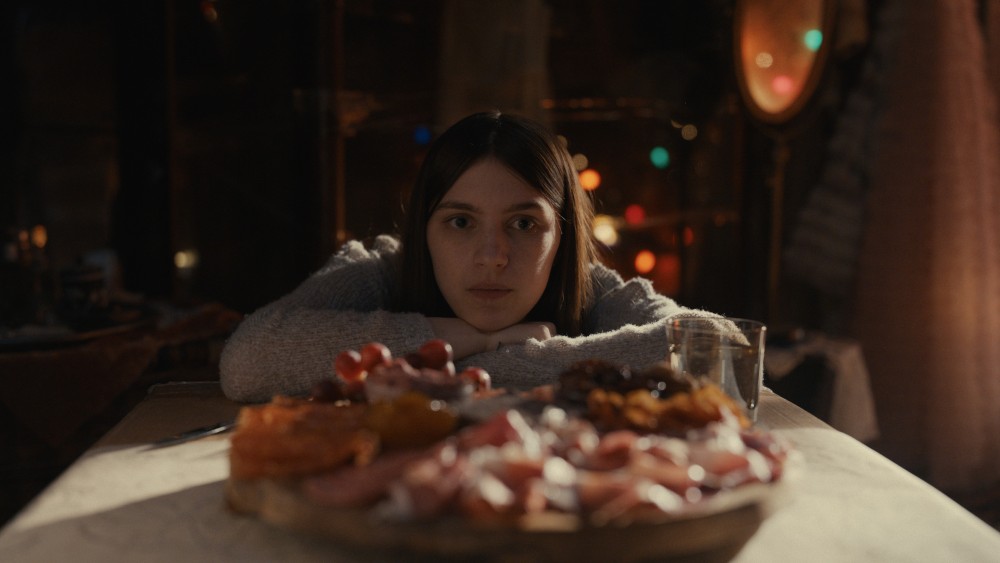
BTL: I spoke to Neil Burger, and he said that your score for The Goldfinch was what got him interested in having you score Voyagers. That’s definitely something I keep hearing from composers is that there can just be one score that people connect with and then others will want to have you score their stuff.
Gureckis: With The Goldfinch, [Susan] was really open to new talent or new people being involved, and that was a studio film. They spent a lot of money on that movie, and they’re not necessarily like, “Oh, let’s just throw the job at like some guy who has no experience.”
BTL: There are maybe two dozen composers who basically get all their work just from their names alone.
Gureckis: At that moment, I had probably like two indie films, like a horror film, and then another little drama that I had worked with her on, and she was like, “I think you’d be good. Why don’t you write a couple of cues?” So I wrote something that ended up being the opening title for the movie itself. But she had to do the hard sell to them, fly there and tell them, “He’s going to be okay. He’s a competent person. We’re gonna figure it out.” [laughs]. So I was writing music, kind of a pre-scoring period of writing music, sending stuff. This was before I was hired for The Goldfinch, but I was sending them stuff and they’d put it in the movie, and then eventually, they’re like, “Alright, let’s give it a shot.” They really liked what happened with the score, so that gave them confidence. I think getting like a studio film gave other people confidence that I could not mess up. [laughs] There’s that threshold I think of, “Okay, you’ve gotten enough experience.” I learned so much working with Philip, anything from… I mean, I worked on Notes on a Scandal. It was a little indie, but it was with Scott Rudin, and he was right in there, and I was hanging out with him a little bit. That was the whole process of demos and recording and just seeing the whole way, so I was very aware of how everything works, even though it wasn’t necessarily my music. I knew how the process unfolded, but it wasn’t like, “Oh, my God, what do we do next?”
BTL: Doing film score is such an interesting field, because you’re working with filmmakers who probably have a good idea for story and visuals, but maybe not every director is familiar with music or how to talk in a musical language to get the music feeling the way they may want it to, which is why having a good composer is so important.
Gureckis: Like you said, I think everyone’s different, and they all take a different point of view. I don’t have a ton of experience, but the experience that I’ve had with Night or John Crowley or Neil Burger. Night’s been really great. He doesn’t temp his work at all with any music. This entire movie, Old, the first cut that I saw had no music, so they edited the film without any music at all. Just imagine seeing a two-hour movie [with] no music. Oh, boy. Which is great, because you’re like, “Oh, I’m gonna be stuck on someone else’s [music] or I’m not gonna be competing against someone else’s score.”
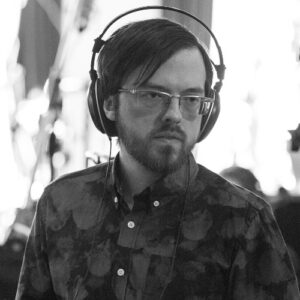
In Servant Season Two, and for Season One, it was always true. No temp music. Even if they were editing and maybe the editor… because it’s different editors for each show, a couple different editors. By the time they got to me and him, it’s more of a producer’s cut. I never really saw the director cuts except when he was involved and the episodes that he directed. It was no music, and it would be like, “Let’s start spotting this.” So it’s finding, “What do you think about this scene? I feel like there should be music here.”
He would kind of talk through a scene and discuss where to start, where to end, and then discuss the characters and points of view and really targeted spotting, which is a real skill that I can really appreciate and learn a lot by working with him. Especially the whole point of view. Music is so great at capturing that and directing the audience but pulling out a performance of someone he might not even be focusing on. Like the camera could be on someone here more centered, but you’re really thinking, “Oh, actually, in this person’s mind over here.” That kind of stuff is really fine-tuned. He has so much experience as a filmmaker and has done so many movies. Fine-tuned spotting is an art, spotting a film and editing film, music editing with music supervision is just like this incredible art of capturing the moment of which music plays a role. How it plays throughout or where it starts and ends can just change the vibe dramatically.
BTL: I know this is Night’s show, although Tony Basgallop created it and has written most of the episodes as well. So you’re not working with each of the individual directors on their episodes?
Gureckis: I’m pretty sure this is the process, but I could be totally wrong. The director has a cut, and maybe I’ve seen a couple of the director cuts and then Night takes over. He’s basically the showrunner although I think he’s listed as executive producer. Then he redoes the cuts or adjusts them or whatever. It could be slight, it could be dramatic, but at that point, it becomes like his product or his point of view of how the episode will be so that’s where I come in at that moment, and then the director I’ve never spoken to.
The process is just sort of in this order that he holds off from music until the very end, because it’s always original music. We never deliver to Apple cuts that don’t have a complete finished score, so Apple never sees an episode that’s not like a pretty well-completed episode that he’s like, “This could be shipped out tomorrow.” He feels confident that Apple could be like, “Oh,” but they rarely come back with notes by then, because we’ve spent time. Some of these end cues for Season 2 are just epic, and that’s because Night is pushing me… “Louder, louder, bigger!”
BTL: Do you have a background in electronic music or synthesis at all from working with Philip or something you’ve done on your own or is that not part of what you do?
Gureckis: No, just some things that are kind of self-taught. Philip never got into that. He kind of had a music producer who would do his electronics, like his keyboards and stuff, early music stuff. But in terms of the electronics that I use, or do, it was all just self-taught and not part of any of my academic education.
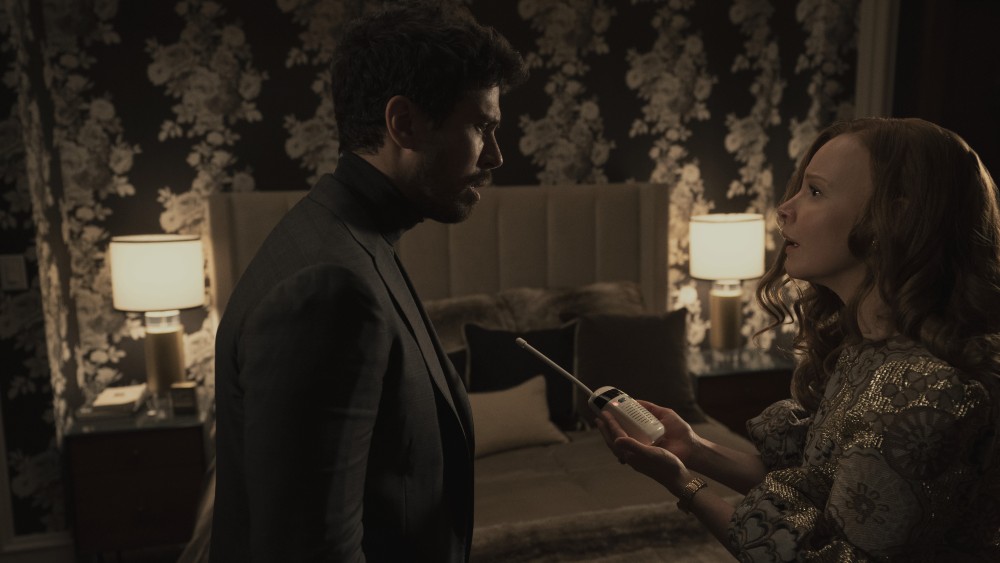
BTL: It definitely seems like Servant is more acoustic instruments and percussion, but when I listened to Voyagers and Bloodline, it seemed to be more electronic. With Servant, is it important to always keep that as real instruments that are played and recorded?
Gureckis: I think it’s always a balance. I always have an electronics part of my language, which is what? That I’m pulling two levers. Servant Season 1 is super-acoustic I think. I was recording all sorts of instruments and playing like a learned violin. I’m not a good violinist, but I’m a composer violinist. I can hold one arpeggio position and the next position and then combine them together and it sounds like I’m doing both.
BTL: You’re playing that stuff yourself rather than trying to explain to a violinist what you want him or her to do with his or her instrument?
Gureckis: Yeah, sometimes. You could totally notate that, but some of that the more aleatoric stuff like it can totally be written out. In Voyagers, I play some things a little bit. They’re not as weird as Servant, but they’re in there. The orchestrator that I worked with on that, David Crystal, he transcribed a bunch of them, and I was like, “Wow, he actually got in there.” Sometimes, we will record things in the orchestra that’s like an augmentation of either of what I played as a soloist violin, or augmentation of the electronics. He’ll sort of do a mimic of the sweeps and the turns and all the stuff of the electronics, and then in the mix, we’ll decide, “Okay, that works” or “That doesn’t work,” but I love to just see how the two meld together. In terms of Bloodline, of course, except for a few cues, it’s just like 100% electronic score and Cliff Martinez kind of like go for it, but then Voyagers is like full orchestra, full brass –we did it in Budapest– but then a lot of electronics, and then what I’m doing with Old right now, it’s just like a huge orchestra, also with a lot of electronics, but we’re still recording and mixing that one. It’s still being figured out how the balance is, but they’re always part of each other. There’s always some kind of balance between the two, and I think with Servant Season Two, I definitely upped the electronics in that relative to Season One.
BTL: Was that because of COVID and the fact that it was easier to do electronic stuff vs. real instruments?
Gureckis: There is some element [of that]. I was wondering when I was finishing Servant Season Two, whether we were gonna just sit down and say, “What’s the COVID score and what’s not a COVID score? I feel like this is a COVID score, because you have to get stuff done, but I was writing a lot of that score on my dresser. I was in a smaller apartment in Hell’s Kitchen. We have this beautiful studio here [in Brooklyn], but by March, it was in lockdown here in New York, so it was just grab your computer and take it home. I have a one-bedroom apartment with no desk and no room for speakers, so I had drives and my computer there and worked on headphones. I had violin and I recorded some stuff, but I also luckily had a huge resource of everything I recorded from Season One, which is common for composers to have basically, like a stem resource of everything they did from the previous season, so that they can go back and be like, “Alright, I’m gonna take this bass line or this electronic thing.” In this case, I had just like tons of performances that I did, luckily, of me bowing instruments. So there would always be acoustic things, but a lot of those acoustic elements were actually pulled in from Season One material. Then I would like effect them to make them have a new kind of energy. This season, this music, if you were to drop queues of this season into Season One, you’d be like, “This is crazy.” Because it’s so out there, it’s so intense, like I can’t imagine someone looking out the window, would listen to this music.
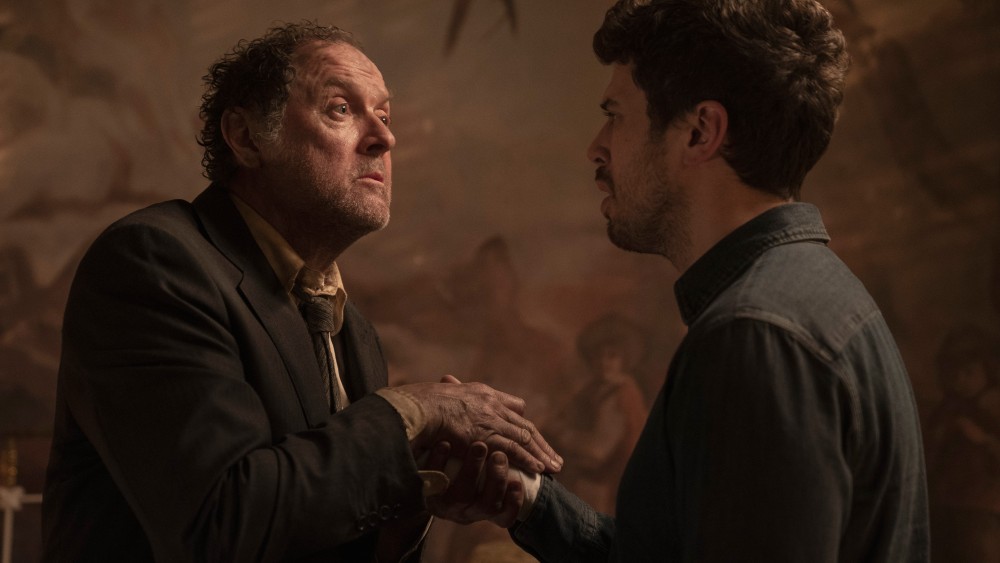
BTL: How were you communicating with Night while you were spotting the shows. Did you find a way of doing that electronically?
Gureckis: There’s a couple of programs I used like Evercast, so I’d send over a cue, they’d put it in the picture. He has a production studio. The house is a set, so then there’s editing suites in there, but during COVID, I think they just downsized. Well, they stopped production for a while, and he was just sort of like working at home with everyone working from hotels remotely, because obviously, you couldn’t see anyone, because no one knew what was going on or how things were transmitted. We were all just like this anyway. But I’ve always been here in New York, and I go to Philly just to see a screening, but I’ve never gone there to actually work or compose. It doesn’t make a difference really. To him, he gets the music, calls me or text me for comments or sends those comments through other people or we have a Zoom call. It’s kind of a typical thing, but he’s the showrunner, so there’s not like a huge line of people. I’m not sure if it’s the same with every show that they have, but Apple doesn’t really have a document of notes that I see. I think they probably filter that into their producers for Night’s show, and then they get sent to me if I need to do anything, but otherwise, he has enough clout with them I think that he can be like, “I don’t want to do that,” and then they’ll be like “Okay.”
BTL: They basically brought him on board, because they wanted an M. Night Shyamalan series and not something you can just see on NBC or ABC.
Gureckis: I think they have confidence in him and this season has done well I think with getting new audiences, so I think they’re all the more like, “Sure, do whatever. You know what you’re doing. The team knows what you’re doing so we trust that you can…” I haven’t started Season Three, but I know they’re shooting it currently, so right after the movie I might jump into Season 3, and I wonder what it looks like. [laughs]
BTL: You’re also a recording artist who has released music as an artist, so is it hard to balance what you’re doing for film and television with what you’re doing for your own enjoyment?
Gureckis: I have a project with my wife. She’s a composer as well named Sugar Vendil, and we lovingly call it Vanity Project. She plays piano, she’s like, a really great pianist, and I do electronics and stuff. We’ve done a couple of small double bills, things where we probably do 20 minutes — we’ve only gotten like 20 minutes of music together, but we have to do more soon. Vanity Project is hard to keep together, because she’s busy doing her commissions, and she’s got a film score that she’s writing for this art project. I’ve got all this film score stuff. It’s music for music’s sake, it’s music to be performed live, all that kind of stuff and nothing like what I do for my films or with Night on Servant or anything like that. It’s totally for our enjoyment, right? Because it’s a Vanity Project. [laughs] Yeah, but it’s hard to do those things, because you really have to find time. Like where’s the gap? Or if you feel like you’re comfortable enough saying, like, “I need a gap.” Now I have a four-month-old so now it’s like … I need a gap. Between Old and Servant, I’m hoping to get a week or something scheduled.
Servant is available to stream on Apple TV+. Look for my interview with Production Designer Naaman Marshall sometime very soon. All photos courtesy of Apple except where noted.





